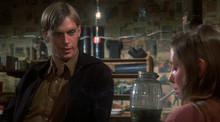 Loading... Please wait...
Loading... Please wait...New Products
Our Newsletter
Product Description
Thieves Like Us (1974)
Director:
Robert AltmanWriters:
Calder Willingham (screenplay), Joan Tewkesbury (screenplay), Edward Anderson, Robert AltmanStars:
Keith Carradine, Shelley Duvall, John Schuck, Bert Remsen, Louise Fletcher, Ann LathamReleased in the same 12-month span as Terrence Malick's Badlands (1973) and Steven Spielberg's The Sugarland Express (1974), Robert Altman's Thieves Like Us (1974) also tells a story of doomed outlaws in love. Depression-era criminals T-Dub (Bert Remsen), Chicamaw (John Schuck), and Bowie (Keith Carradine) band together to rob banks after escaping from a prison farm. Hiding out with Dee Mobley (Tom Skerritt) and Keechie (Shelley Duvall), and then with T-Dub's in-law Mattie (Louise Fletcher) between bank jobs, the three crooks are a loyal group, but increasingly sensational news accounts of their bloodless robberies force them to split up before their next crime. After a car accident, Chicamaw leaves the injured Bowie in Keechie's care. Love blossoms between the two naïfs, compelling Bowie to find a way to balance his bond to Keechie with his loyalty to his friends and the need for money to head for Mexico. With the law closing in, Bowie and Keechie learn the hard way about the finite honor among thieves, and the need to survive. Adapted from the same Edward Anderson novel as Nicholas Ray's They Live By Night (1949), Altman, writers Calder Willingham and Joan Tewkesbury, and Altman's acting "regulars" reworked not just the classical crime movie but also the 1967 hit Bonnie and Clyde, presenting a resolutely unglamorous portrait of this Coke-swilling outlaw couple and the survivors' stoic drive to carry on. With the radio providing soundtrack and commentary, and the newspapers sending a veiled warning, Bowie and Keechie cannot escape the outside world, but they also cannot transcend it into the realm of myth. Rather than turning the crimes into stylish exploits, Altman's camera remains outside most of the robberies, observing the banal action on the street; he saves the slow-motion in the climactic shoot-out for the witnesses rather than the dead. His zoom shots hover between fragments of emotion and place, while they maintain their observational distance. Unfortunately for Altman (and Malick and Spielberg), audiences preferred outlaw glamour to genre-bending introspection. Still, with its deceptively laid-back tone, eye for expressive detail, and ear for ironic juxtaposition, Thieves Like Us takes its place in Altman's exceptional body of early 1970s work.
Currency Converter
Choose a currency below to display product prices in the selected currency.

















